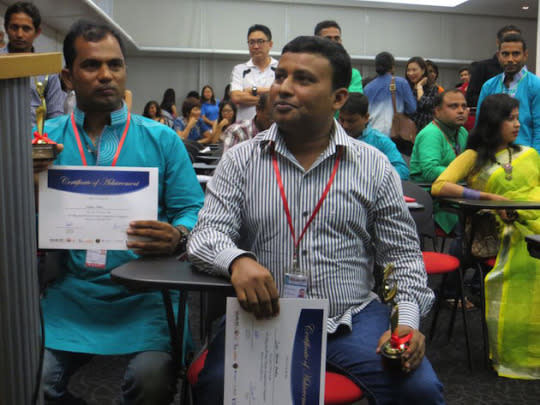Construction supervisor reminisces life back home through poetry

Second prize winner Mohor Khan (left) with first prize winner Zakir Hossain Khokon (right) (Photo: Bryan Kwa)
By Bryan Kwa
While 38-year-old Zakir Hossain Khokon, a Bangladeshi construction supervisor who arrived in Singapore in 2003, battles the social exclusion he faces as a migrant worker, he also channels his thoughts on how he misses his family back home in Dhaka through poetry.
His poem, written in his native language of Bengali, talks of how he draws a portrait of the people he’s missing and hangs it on the wall. “Then I talk to the audience: ‘Hey, I’m sorry because I put this portrait on the wall.’ Then I explained what is in there. At the end of the poem, I say I am sorry. Then, I take down my portrait.”
Zakir’s heart-rending poem-painting won him the first prize in the Migrant Worker Poetry Competition 2015 on Sunday night (13 Dec) at the National Library. He also came out tops in the same competition last year.
Titled ‘I am sorry’, his winning poem conveys migrant angst through a painting with words. He tells Yahoo Singapore he draws the feelings of the ‘migrant worker’ on the portrait and explains it with the poem.
Zakir is also a freelance journalist with Banglar Kantha, a Bengali newspaper in Singapore. He is also a published poet, releasing two collections, including a non-fiction work titled, ‘Singapore riots and a love story’.
The crowd at the competition were treated to poetry in various languages: Bahasa Indonesia, Tagalog, Mandarin, Bengali, Punjabi, Tamil, and English. Students from United World College read the English translation of the poems.
Some audience members were teary-eyed as the poems touched on themes such as the calculations of migrant life and the suffering of a mother who leaves behind her young children to be a foreign domestic worker.
For example, the poem of Filipina domestic worker Rolinda O.Espanola, titled ‘My Wish’, is a very personal message for her daughter who celebrated her seventh birthday recently and for all the family events she missed while working in Singapore.
Are we prejudiced towards thinking migrant workers are “uneducated”?

Debbie Fordyce from TWC2 speaking at the Migrant Worker Poetry Competition 2015 (Photo: Bryan Kwa)
The finals were judged by poet Alvin Pang, academic Kirpal Singh and translator Goh Beng Choo.
Singh said the poems need to have a transformative quality for them to be performed, "And I think our lives have been transformed. And as judges, we want to acknowledge that. We are humbled by the experiences that have been captured as beautifully.”
Describing many of the poems as “deeply moving”, Pang said, “We cannot even pretend to begin to know what’s going on. We can only begin to understand the blindness that has afflicted us for so long, so much that we do not know and do not see among us.”
Debbie Fordyce from Transient Workers Count Too (TWC2), one of the competition’s partners, said, “Many of the workers here have a level of education that exceeds that even of their employers. This may seem like a shocking sort of thing, but it’s true. Their education certainly qualifies them for jobs far beyond what they are doing here. And that’s why we shouldn’t be surprised to see this sort of talent, especially from the kind of people that we’ve seen here from countries that have a long tradition of literature and the arts.
“But what does it say about us when we find this surprising, when we don’t expect to see this kind of talent and passion and emotion among the people that do the dirty jobs in Singapore? It could be that some of us still hold those usual prejudicial views of migrant workers as being uneducated and unqualified for skilled work.”
Poetry competition aims to integrate migrant workers into Singapore society

Finalists of the Migrant Worker Poetry Competition 2015 pose with their certificates, together with the judges and organisers (Photo: Bryan Kwa)
Organisers said this year’s edition had triple the number of participants. Out of the 74 contestants, 65 per cent were female and a lot of them were mothers.
Leader of the organising committee, writer and management consultant Shivaji Das, said the competition had attracted a wide variety of participants – from people with “a sophisticated sense of literature” to people who are “actually writing for the first time” and those “trying to use Singlish for their poems”.
He also recounted “anxious moments” including how, when he was calling some of the domestic workers, their employers picked up the phones, pretending to be the contestants. He had some convincing to do before they handed over the phone to the contestants.
“Nonetheless, I’m glad to say that all the employers have been supportive and all of them (the contestants) are present here today to say their poetry.”
He believes the “eventual goal” of this competition is not just to showcase the literary talents of migrant workers but also to have “tangible” impact on their living conditions in Singapore.
“Hopefully in the long term, we wouldn’t even need a migrant worker poetry competition because the title of such an event would seem rather needless at that point in time because the society and the groups are assimilated by then.”
He has plans to expand the competition and reach out to more migrant workers by working with dormitories, bus drivers, restaurants workers, and sex workers.

